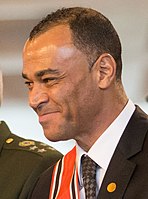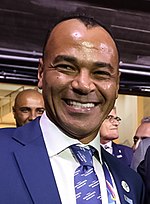
Overview
Marcos Evangelista de Morais (born 7 June 1970), known as Cafu , is a Brazilian former professional footballer who played as a defender. With 142 appearances for the Brazil national team, he is the most internationally capped Brazilian player of all time. He represented his nation in four FIFA World Cups between 1994 and 2006, and is the only player to have appeared in three consecutive World Cup finals, winning the 1994 and 2002 editions of the tournament, the latter as his team’s captain where he lifted the World Cup trophy. With Brazil, he also took part in four editions of the Copa Amrica, winning the title twice, in 1997 and 1999; he was also a member of the national side that won the 1997 FIFA Confederations Cup.
At club level, Cafu won several domestic and international titles while playing in Brazil, Spain and Italy; he is best known for his spells at So Paulo, Roma and Milan, teams with which he made history, although he also played for Real Zaragoza, Juventude and Palmeiras throughout his career. Known for his pace and energetic attacking runs along the right flank, he is regarded as one of the greatest full-backs of all time, one of the best defenders ever to play in the Italian Serie A,[1][2][3] and as one of the greatest Brazilian and South American players of his generation.[4][5] In 1994, he was named South American Footballer of the Year, and in 2004, he was named by Pel in the FIFA 100 list of the world’s greatest living players.[6] In 2005 he was named in the FIFA World XI.
Early life
One of six children, Cafu was raised in the Jardim Irene favela of So Paulo. At the age of seven, he was able to attend a football academy and soon moved up to the junior sides of Nacional-SP, Portuguesa and Itaquaquecetuba. He also played futsal for two years.
In the early 1980s, he was rejected from the youth squads of Corinthians, Palmeiras, Santos, Atltico Mineiro and Portuguesa. It was not until 1988 that he made the youth squad of hometown club So Paulo, and subsequently won the Copa So Paulo youth tournament that year, but he did not play during the next season as So Paulo won the 1989 Campeonato Paulista.
Club career
It was during this time, however, that So Paulo youth coach Tel Santana became Cafu’s mentor. He suggested that Cafu move from wingback to midfield, a spot into which Cafu made the transition with ease despite never previously playing the position. He had soon anchored onto the first team, as So Paulo won back-to-back Copa Libertadores and World Championships in 1992 and 1993. In 1994, he was named the South American Footballer of the Year. Cafu began the 1995 season with Brazil squad Juventude but finished in Spain with Real Zaragoza, winning the 1995 Cup Winners’ Cup with the latter.
After a brief stint back in Brazil with Palmeiras in 1996, Cafu returned to Europe once again the next year, this time with Roma, and won the Scudetto in 2001, followed by the Supercoppa Italiana. It was during his tenure at Roma that Cafu earned the nickname Il Pendolino (“The Express Train” or “The Commuter”). Despite making the Coppa Italia final in 2003 with Roma, he moved to Milan after turning down a move to Japan with Yokohama F. Marinos. With the Rossoneri, he won his second career Scudetto in 2004, followed by his second Supercoppa Italiana, and he played in his first UEFA Champions League final in 2005.
Despite his success with Milan, he continued to hold fond memories of his Roma years, and it was for that reason that on 4 March 2007 – the day after Milan eliminated Celtic in the first knockout round of the 2006-07 UEFA Champions League – he candidly revealed in a UEFA.com chat that he did not want Milan to be drawn against the Giallorossi in the quarter-final round. He got his wish, as Milan were drawn against Bayern Munich. Milan’s successful Champions League campaign saw Cafu finally pick up a long-awaited winners’ medal, in a rematch of the 2005 final.
Cafu signed a contract extension in May 2007 that would keep him with Milan until the end of the 2007-08 season, during which he won another UEFA Supercup, and his third World Title at Club level and now his first FIFA Club World Cup. On 16 May 2008, it was announced that Cafu and compatriot Serginho would be leaving Milan at the end of the season. In Cafu’s last game of his Milan career, and maybe his footballing career, he scored a goal in their 4-1 victory over Udinese. Milan vice-president Adriano Galliani has opened the doors to him to return to work for the club.
He is a member of the A.C. Milan and the A.S. Roma Hall of Fame.
Passport controversy
Cafu was accused along with several other Serie A players, including Roma teammate Fbio Jnior and Gustavo Bartelt, countryman and later Milan teammate Dida, of using a forged passport in their attempt to dodge regulations regarding the number of non-European players allowed on Italian club rosters. However, the charge was cleared by the Italian Football Federation (FIGC) as Cafu’s Italian passport was real and issued by Italian officials, but 13 others – including Dida – were banned.[7] But Cafu faced another controversy that similar to Juan Sebastin Vern, accused that Cafu’s wife, Regina used falsified documents to claim Italian nationality through Italian descent.[8] Cafu acquired Italian nationality through marriage. In 2004, Cafu and Roma club president Franco Sensi went to court.[9][10]
On 12 June 2006, less than 24 hours before Brazil were to begin their 2006 World Cup campaign against Croatia, Rome prosecutor Angelantonio Racanelli called for the imprisonment of Cafu, his wife Regina de Morais and his agent for nine months following the resurfacing of a false-passport scandal.[11] The very next day, however, Cafu, his wife and agent were acquitted of all charges.[12]
International career
 Cafu training with Brazil before the 2006 World Cup
Cafu training with Brazil before the 2006 World Cup
Cafu is the most-capped Brazilian men’s player of all time with 142 appearances, including a record 21 World Cup games. He has won two World Cups in 1994 and 2002, as well as being the only player to participate in three World Cup final matches. Cafu also held the record of winning the most matches in World Cups with 15 (along with two games Brazil won on penalties), before being surpassed by Germany‘s Miroslav Klose in the 2014 World Cup.
He earned his first cap in a friendly against Spain on 12 September 1990, and played sparingly for Brazil in the early 1990s, making the 1994 World Cup roster as a substitute. He appeared in the final against Italy, following an injury to Jorginho in the 22nd minute. After that, Cafu was soon a regular in the starting eleven as Brazil won the Copa Amrica in 1997 and 1999, the 1997 FIFA Confederations Cup, and reached the 1998 World Cup final.
 Cafu at a Gillette promotion with Brazil in 2010
Cafu at a Gillette promotion with Brazil in 2010
Brazil endured a rocky qualification for the 2002 tournament, during which Cafu came under heavy criticism from coach Wanderley Luxemburgo, who stripped him of the team captaincy after he was sent off in a qualifier against Paraguay. Shortly after that, however, Luxemburgo was out of a job, and replacement Luiz Felipe Scolari made Emerson his new choice for captain. However, Emerson missed the cut after he dislocated his shoulder in training, which allowed Cafu to regain the armband. After Brazil defeated Germany 2-0 in the final match (Cafu’s third consecutive World Cup final), he stood on the victory podium during the postmatch celebration and, as he raised the World Cup trophy, shouted to his wife, “Regina, eu te amo!” (“Regina, I love you!”).[13]
Cafu and Brazil fell short of high expectations placed on the squad four years later in 2006, as Brazil meekly exited in the quarter-finals after a 1-0 defeat by France.[14] Coach Carlos Alberto Parreira was criticized for featuring fading veterans, most notably the 36-year-old Cafu and 33-year-old Roberto Carlos, in the starting XI in lieu of younger players. Cafu was one of only a few Brazil players who spoke to the press in the midst of a hailstorm of criticism from Brazilian fans and media alike following the team’s return home. He nonetheless expressed interest in participating in the 2010 World Cup; however he did not, as he retired completely from football in 2008.
Style of play
 Cafu (pictured with Milan in 2007) was known for his great ability to attack and defend as a right back
Cafu (pictured with Milan in 2007) was known for his great ability to attack and defend as a right back
Regarded as one of the greatest full-backs of all time, one of the best footballers of his generation, and as one of Brazil’s best ever players,[1] Cafu was a dynamic, hard-working, offensive-minded, and energetic right-sided wing-back who is mostly remembered for his great pace, stamina, tactical intelligence, distribution, and technical skills, as well as his ability to make overlapping attacking runs down the right flank and provide accurate crosses to teammates in the area.[15][16][17][18][19]
In addition to his footballing ability, he was also known for his discipline, leadership and his characteristically cheerful demeanour.[20][21][22] Although he usually played as an attacking right-back, he was also capable of playing as a centre back, due to his defensive skills, or in more advanced positions, and was often deployed as a right winger. During his time in Italy, he was given the nickname Pendolino, after the country’s express trains.[23][24][25][26][27][28]
Career statistics
Club
Club performanceLeagueCupContinentalTotalSeasonClubLeagueAppsGoalsAppsGoalsAppsGoalsAppsGoalsBrazilLeagueCopa do BrasilSouth AmericaTotal1990So PauloSrie A2012011991201201199221121119931811811994162162SpainLeagueCopa del ReyEuropeTotal1994-95Real ZaragozaLa Liga16010170BrazilLeagueCopa do BrasilSouth AmericaTotal1995PalmeirasSrie A190190199616016019970000ItalyLeagueCoppa ItaliaEuropeTotal1997-98RomaSerie A311503611998-99201502511999-200028240503722000-0131120704012001-02270101023822002-03260311204112003-04Milan28110903812004-053311204512005-0619110502512006-0724030803502007-081512010181TotalBrazil13061306Spain16010170Italy282922174237812Career total4281522175252518
International
Brazil national teamYearAppsGoals199030199190199220199312019947119955019963019972001998122199912020001012001602002120200370200490200580200650Total142[30]4
International goals
- Scores and results list Brazil’s goal tally first.
#DateVenueOpponentScoreResultCompetition1.8 June 1994Jack Murphy Stadium, San Diego, United States![]() Honduras6-28-2Friendly2.3 June 1998Stade de Paris, Saint-Ouen, France
Honduras6-28-2Friendly2.3 June 1998Stade de Paris, Saint-Ouen, France![]() Andorra3-03-03.14 October 1998Robert F. Kennedy Stadium, Washington, D.C., United States
Andorra3-03-03.14 October 1998Robert F. Kennedy Stadium, Washington, D.C., United States![]() Ecuador3-15-14.23 May 2000Millennium Stadium, Cardiff, Wales
Ecuador3-15-14.23 May 2000Millennium Stadium, Cardiff, Wales![]() Wales2-03-0
Wales2-03-0
Honours
Club
- So Paulo[31]
- Campeonato Brasileiro Srie A (1): 1991
- Campeonato Paulista (2): 1991, 1992
- Copa Libertadores (2): 1992, 1993
- Intercontinental Cup (2): 1992, 1993
- Supercopa Sudamericana (1): 1993
- Recopa Sudamericana (2): 1993, 1994
- Copa CONMEBOL (1): 1994
- Real Zaragoza[31]
- Palmeiras[31]
- Campeonato Paulista (1): 1996
- Roma[31]
- UEFA Super Cup (2): 2003, 2007
- Serie A (1): 2003-04
- Supercoppa Italiana (1): 2004
- UEFA Champions League (1): 2006-07
- FIFA Club World Cup (1): 2007
International
- FIFA World Cup (2): 1994, 2002
- Copa Amrica (2): 1997, 1999
- FIFA Confederations Cup (1): 1997
Individual
- South American Team of the Year (4): 1992, 1993, 1994, 1995[34]
- South American Footballer of the Year (1): 1994[35]
- FIFA World Cup All-Star Team: 2002 (Reserve)[36]
- FIFA 100[37]
- UEFA Team of the Year (2): 2004, 2005[33]
- FIFPro World XI (1): 2005[38]
- Sports Illustrated Team of the Decade: 2009[39]
- ESPN World Team of the Decade: 2009[40]
- World Soccer Greatest XI of all time: 2013[41]
- A.C. Milan Hall of Fame[32]
- A.S. Roma Hall of Fame[42]
- World XI: Team of the 21st Century[43]
Orders
- Officer of the Order of Rio Branco: 2008

